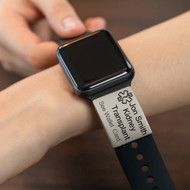Should I wear a Medical ID if I am a transplant patient?
Posted by Lori Torman on 20th Oct 2025
Most transplant patients should wear a medical ID to ensure they receive appropriate and safe medical care during an emergency. Since there are no visible signs that a person has received a transplant, an ID can be critical if the patient is unable to communicate.
Why a medical ID is important
- Avoids treatment delays. Emergency responders are trained to look for medical identification on the neck or wrist. The ID can quickly inform them of a transplant, enabling faster and more accurate treatment.
- Prevents dangerous drug interactions. Transplant recipients must take immunosuppressant medications to prevent their body from rejecting the new organ. The ID can alert medical staff to this and other medications to prevent potentially harmful drug interactions or avoid contraindicated drugs.
- Protects from misdiagnoses. In an emergency, a patient's symptoms can be misinterpreted. The medical ID helps doctors understand the underlying transplant history, ensuring they do not pursue a course of treatment that could harm the patient or their new organ.
- Ensures specific treatment needs are met. Some transplants require specific medical considerations. For example, stem cell transplant patients need irradiated and CMV-safe blood products, a fact that should be communicated via their ID.
What to engrave on a medical ID from StickyJ.com
Your specific transplant team can help determine what information is most critical for your ID. Key details often include:
- Patient's full name
- Type of organ transplant (e.g., "Kidney transplant recipient")
- Immunosuppressant medication status (e.g., "Immunosuppressed" or the specific drug name)
- Any drug or food allergies
- Other significant medical conditions
- In Case of Emergency (ICE) phone number(s)
- See Wallet Card (if more information is needed)
Apple ID Tag shown in photo is available from StickyJ.com.
This is for informational purposes only. For medical advice or diagnosis, please consult a medical professional.


